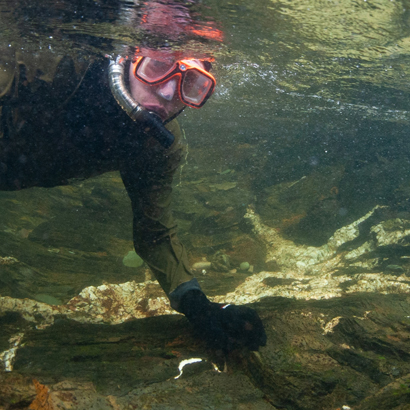Senior Thesis Requirements
A student enrolled for Senior Thesis (WILD 499) credit conducts independent study with the approval of a faculty advisor and committee. Senior Thesis is distinct from Independent Study (WILD 492). A Senior Thesis may involve a variety of different types of activities and analyses such as the collection of field or lab data, secondary data analysis, a policy analysis, or content analysis, and it requires (1) submission of a formal written proposal to the prospective faculty advisor and committee, complete with sections that provide an introduction to, and the significance of, a particular problem; the specific question that the student wishes to address; how an answer to that specific question will refine our understanding of the broader issue described in the introduction; and the methods to be employed; a committee-approved proposal is necessary before work can begin; (2) that the question, significance, and approach be judged by the faculty sponsor to be meritorious and potentially publishable in nature; students will be encouraged to submit a manuscript for publication; (3) that the student present a summary of the problem and his or her findings in Senior Wildlife Seminar (WILD 494), The Wildlife Society student chapter meetings, or some other appropriate venue; and (4) that a written report be completed and a defense before the committee occur as the basis of an overall evaluation by the faculty advisor and committee. Credits are variable, but should correspond with the anticipated time needed to conduct and complete the project.
In general, Senior Thesis is reserved for students who show evidence that they are budding research wildlife biologists, and the thesis should help them achieve related goals. At a minimum, students should be question-oriented and should want to work independently to solve a problem. Most are probably motivated to attend graduate school, but some may simply want to hone their own independent problem-solving skills.
To be eligible to do a Senior Thesis, a student must have at least a 3.5 Grade Point Average and/or be in the Honors Option for Wildlife Biology. The Senior Thesis advisor must be a faculty member in Wildlife Biology. The three-member committee must have at least one committee member from WBIO/FOR and WBIO/DBS. The student must defend their thesis proposal and thesis during the academic year.
Opportunities exist to apply for external funding to support a student’s research project. A small amount of funding is available for those students enrolled in the Honors College; the EPSCoR program also has such funds. Individuals developing proposals should talk with their faculty supervisors about these possibilities.
